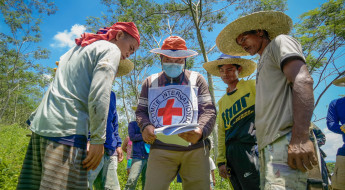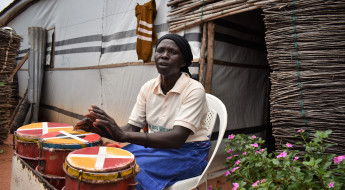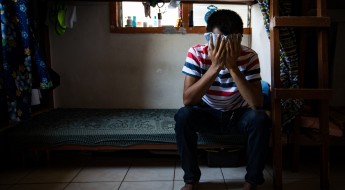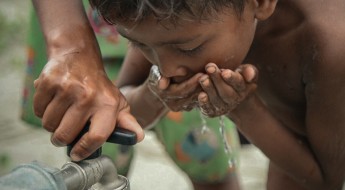Myanmar: Food to fuel families in Rakhine
 “Today’s meal is fish curry. It is one of my youngest son’s favourite dishes.” – ShonCC BY-NC-ND / ICRC / Hla Yamin Eain
“Today’s meal is fish curry. It is one of my youngest son’s favourite dishes.” – ShonCC BY-NC-ND / ICRC / Hla Yamin Eain “I am cooking prawns with banana stems. It is simple to cook and takes just a few minutes to prepare.” – Dilta.CC BY-NC-ND / ICRC / Hla Yamin Eain
“I am cooking prawns with banana stems. It is simple to cook and takes just a few minutes to prepare.” – Dilta.CC BY-NC-ND / ICRC / Hla Yamin Eain "I am making chilli paste. I will use it to cook spicy beef with potatoes. I make this dish often and sometimes add fish or prawns instead of beef.” – ShitaCC BY-NC-ND / ICRC / Hla Yamin Eain
"I am making chilli paste. I will use it to cook spicy beef with potatoes. I make this dish often and sometimes add fish or prawns instead of beef.” – ShitaCC BY-NC-ND / ICRC / Hla Yamin Eain “I made spicy prawns and sweet fish today. My family enjoys the meals I prepare.” – BuriCC BY-NC-ND / ICRC / Hla Yamin Eain
“I made spicy prawns and sweet fish today. My family enjoys the meals I prepare.” – BuriCC BY-NC-ND / ICRC / Hla Yamin Eain “I am cooking okra with prawns. This meal is for ten people. I make the best beef curry.” – LashaCC BY-NC-ND / ICRC / Hla Yamin Eain
“I am cooking okra with prawns. This meal is for ten people. I make the best beef curry.” – LashaCC BY-NC-ND / ICRC / Hla Yamin Eain
Every morning, people in Rakhine State's Hgnet Chaung camp for those displaced by conflict light fuel sticks made of rice husks to cook for their families.
Despite having limited access to ingredients, they manage to prepare appetizing meals every day. Cooking with only a couple of tablespoons of oil, a few cups of water, a sprinkle of salt and some home-made chilli paste – this daily ritual is just one way of expressing care for each other.
Hgnet Chaung camp in Rakhine State's Pauktaw Township hosts about 1700 families that were displaced following outbreaks of violence in 2012. Since then, those living in the camp have had limited access to basic necessities, including cooking items.
The International Committee of the Red Cross (ICRC) has been providing these families with fuel sticks for cooking. The fuel sticks help to reduce deforestation and minimize exposure to any security risks people may encounter while collecting firewood outside the camp.
The ICRC has been present in Rakhine State since 2012, providing humanitarian assistance and supporting people of all communities affected by armed conflict. Working with our partner, the Myanmar Red Cross Society, we provide emergency response, access to water and sanitary facilities, improved health-care services and support for sustainable livelihoods. Our teams also work to raise awareness of landmines, assist people with disabilities, help trace missing people and reunite families, as well as provide various services to secure better living conditions for detainees.




